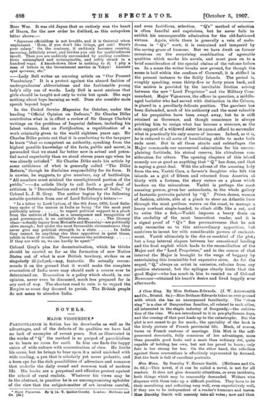NOVELS.
MAJOR VIGOURE11%.*
PARTICULARISM in fiction has its drawbacks as well as its advantages, and of the defects of its qualities we have had no lack of examples of recent years. But as illustrated in the works of " Q " the method is so purged of parochialism as to leave no room for cavil. In him one finds the happy union of wide culture with concentration of view. He limits his scene, but he brings to bear upon it a mind enriched with wide reading, a pen that"is scholarly yet never pedantic, and a keen eye for the rich possibilities of adventure and romance that underlie the daily round and common task of modern life. His books are a perpetual and effective protest against the school of rural realists. Whatever his views may be in the abstract, in practice he is an uncompromising upholder of the view that the subject-matter of art involves careful, * Ma' Vigoureux. By Q (A. T. gainer-Couch). London: Methuen and Co. Lea.] and even fastidious, selection. "Q's" method of selection is often fanciful and capricious, but he never fails to exhibit his unconquerable admiration for the old-fashioned virtues. Again, while there is generally a vein of melo- drama in " Q's" work, it is restrained and tempered by the saving grace of humour. But we have dwelt on former occasions on the surprising combination of agreeable qualities which marks his novels, and must pass on to a brief consideration of the special claims of the volume before us. In a sense the writer breaks new ground, for though the scene is laid within the confines of Cornwall, it is shifted in the present instance to the Scilly Islands. The period is, roughly speaking, some thirty-five or forty years back, and the motive is provided by the inevitable friction arising between the new "Lord Proprietor" and the Military Com- mandant. Major Vigoureux, the officer in question, a middle- aged bachelor who had served with distinction in the Crimea, is placed in a peculiarly delicate position. The garrison has been disbanded, much of his authority and the most valuable of his perquisites have been swept away, but he is still retained as Governor, and though conscience is always pricking him to resign what has become a sinecure, as the sole support of a widowed sister he cannot afford to surrender what is practically his only source of income. Indeed, as it is, he is reduced to all sorts of humiliating shifts to make both ends meet. But in all these straits and subterfuges the Major commands our unreserved admiration for his uncom- plaining fortitude, his stoical reserve, his chivalrous con- sideration for others. The opening chapters of this island comedy are as good as anything that " Q" has done, and that is saying a great deal. With the advent of the amazing lady from the sea, Vashti Cara, a farmer's daughter who left the islands as a girl of fifteen and returned from America at thirty with a fortune, the story enters on a phase which borders on the miraculous. Vashti is perhaps the most amazing person, given her antecedents, in the whole gallery of fantastic portraits painted by " Q." Prima donna, woman of fashion, athlete, able at a pinch to steer an Atlantic liner through the most perilous waters on the coast, to manage a heavy rowboat single-handed, to climb cliffs like a cat, and to swim like a fish,—Vashti imposes a heavy drain on the credulity of the most benevolent reader, and it is a signal proof of " Q's " fine persuasiveness that he not only reconciles us to this extraordinary apparition, but contrives to invest her with considerable powers of enchant- ment. Vashti ultimately is the des ex machind of the plot ; but a long interval elapses between her sensational landing and the final exploit which leads to the reconciliation of the Major and the " Lord Proprietor," and in the course of that interval the Major is brought to the verge of beggary by entertaining this irresistible but expensive siren. As for the sequel, " Q," always an artist in omission, refrains from any positive statement, but the epilogue clearly hints that the good Major—who has much in him to remind us of Colonel Newcome—obtained his heart's desire and lived happily ever afterwards.






























































 Previous page
Previous page